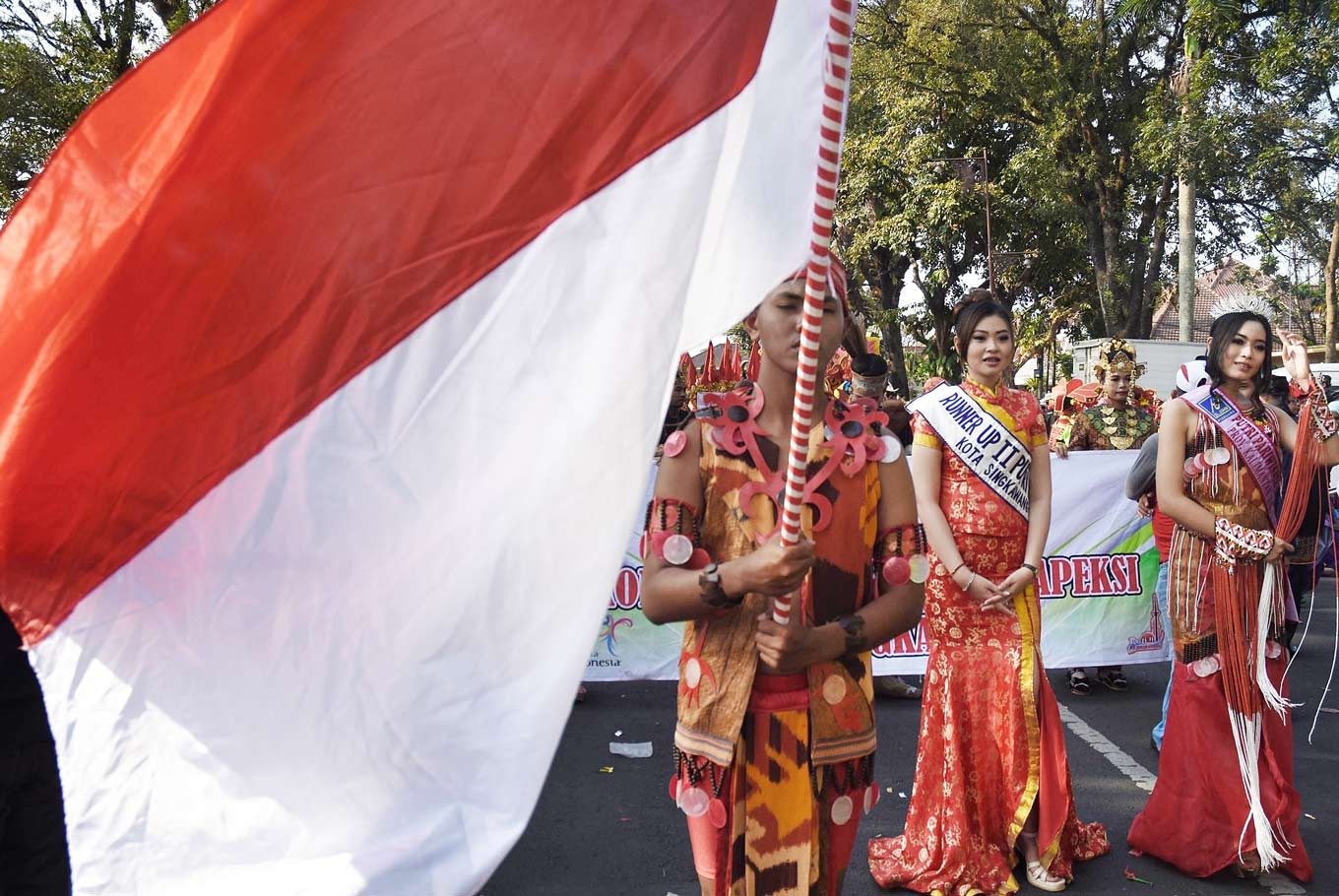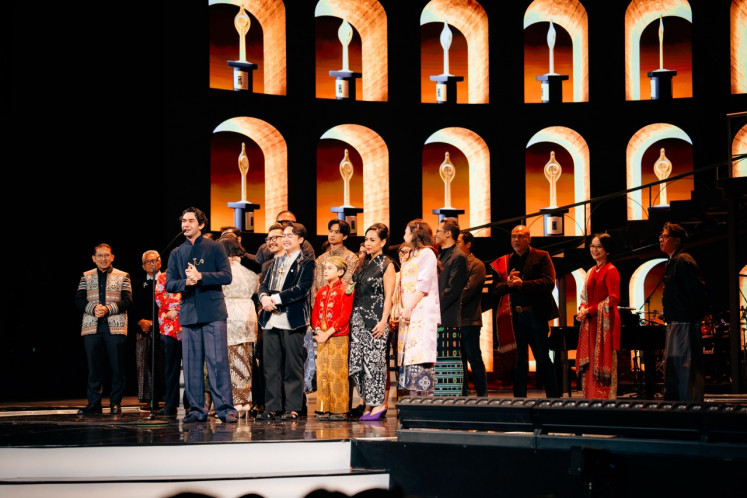Popular Reads
Top Results
Can't find what you're looking for?
View all search resultsPopular Reads
Top Results
Can't find what you're looking for?
View all search resultsEssay: Beyond boundaries
In Indonesia, we have witnessed how centuries of politically motivated prejudice against Chinese-Indonesians play itself out in the ugliest form possible during the May 1998 riots.
Change text size
Gift Premium Articles
to Anyone
J
ohan (not his real name) and I went to the same elementary school. We are both Indonesians of Chinese descent. Reuniting with him recently, I remember an incident that happened to both of us almost 16 years ago.
There was a teacher who said that people with yellow skin are not Indonesians; those who can be validly called pribumi (indigenous) Indonesians are those with brown skin. The rest are foreigners with whom students must be careful because we are basically insincere, petty-minded and shrewd, he concluded in his brief speech.
Then, I remember seeing Johan coming to school with scratches all over his arms and face.
“I hate my own skin color,” I recall him saying.
When we met again 16 years later, he joked: “A bad idea, that skin-scratching thing. I could have soaked in the sun instead to get a tan. Racial prejudice is a painful thing to go through. It forces you to be something other than who you really are.”
Johan is not alone. In Dreams of My Father, Barack Obama recounted a story about an African-American man who bleached his skin to look white — quite an inverse phenomenon to the one Johan and I were experiencing in Indonesia.
Prejudice is the worst consequence of human perception, yet sadly, it is hard-wired into our brains. To make sense of the world, people categorize and classify information based on proximity and similarities. The same principle goes to the classification of people coming from different socio-cultural backgrounds in this diverse world.
Classification and stereotypes are our initial effort to understand different people from different ethnic and religious backgrounds. Yet, as we get older, some of us can sort out information and add exceptions to the rule to escape the trap of narrow-minded prejudice, and begin to perceive people as multi-dimensional, helping us to transcend racial and religious boundaries.
Some, unfortunately, are not capable of making that abstraction and remain trapped in their own prejudiced thoughts. Locally, I have witnessed some chilling consequences of prejudice allowed to unleash itself unfettered; malicious labels like calling Chinese-Indonesians “pigs,” or calling for the mass murders of the infidels (non-Muslims, that is).
Globally, we have also seen similar trends being imposed on immigrants and Muslims. Whoever happens to be a minority and a less privileged member of a given society at any time must swallow the bitter pill of structural violence in the form of blatant discrimination.
This phenomenon is obvious enough when you look at European countries such as France and the Netherlands with their hateful ultra-right leaders, such as Marine le Pen and Geert Wilders, respectively. The United States has Donald Trump. Recently, certain pressure groups in Indonesia are also pushing for the curtailment of political and economic rights of the Chinese-Indonesian community.
Consequences of racist and religious-based hate narratives go beyond lip service. The Southern Poverty Law Center in the United States, for example, recorded 867 cases of hateful harassment or intimidation in the US in the 10 days after the Nov. 8, 2016, election, as quoted by CNN.
In Indonesia, we have witnessed how centuries of politically motivated prejudice against Chinese-Indonesians play itself out in the ugliest form possible during the May 1998 riots.
Nations need the myth of shared identity and history to maintain unity. This shared identity unavoidably morphs itself into very narrow ethnic-and religious-based nationalism, resulting in certain groups becoming second-class citizens.
Writer Francis Fukuyama suggests in his 2014 book Political Order and Political Decay: From the Industrial Revolution to the Globalization of Democracy that instead of imposing a race-and religious-based identity onto a diverse society, politicians should instead endeavor to create a narrative built around shared history and common cultural ground among people of different backgrounds to maintain unity.
This, unfortunately, is tricky to implement, because the vague definitions of “shared history” and “common cultural ground” could easily be manipulated into yet another form of exclusivist attitude, resulting in yet other groups of people becoming second-class citizens.
Maintaining harmony in a diverse world delineated by national, racial and religious borders is like walking on a tightrope. It will be hard for the average persons to get out of their boxes, or not to box people in based on social categories. What should the minority do amid this repressive environment? Do we want to remain bitter and stay the victim?
I find that in the end, the only thing we can do to mitigate this situation is by altering the way we want to perceive ourselves and other people, which dictates how we will treat ourselves and others. We do not have to succumb to the myopic labels that our societies have attached to us.
This notion of transcending identities has been explored mainly by multiracial writers such as Amin Maalouf, with his Egypt-Lebanese and Christian-Catholic background. In his 1999 memoir Out of Place, Palestinian-American writer Edward Said also talked about defying definitions.
I have also gone through this process recently. Being confused by my identity as a Batak-Chinese-Manadonese-Minang person with a curiously a strong Javanese accent, I often find my “Chineseness” to be quite salient and feel fearful of being singled out whenever I walk in rural areas.
I felt some relief when I went to India recently for the first India-ASEAN youth summit, meeting with delegates from India and 10 ASEAN countries. I had no problem being a stranger, because at that time, nobody seemed to care I was Chinese, unlike the situation I often have to face in Indonesia.
Some participants thought that I come from Thailand or the Philippines. Alternately, I also thought that someone I met at the summit came from Vietnam when in fact, he is from the Philippines. Here, boundaries begin to blur.
The experience, interacting with people from various ASEAN countries who pretty much share the same range of skin color tones, I was finally able to transcend my ethnicity and discover a common thread among us that is our humanity.
I began to make peace with the racism I experienced in Indonesia. I hope that once I am able to make peace with myself, I can finally make peace with the world outside and vow to be a good global citizen who treats myself and others respectfully. Jai ho (let there be victory) for a peaceful human co-existence, where social justice and human dignity prevail.
I know this is utopia, which is a road to nowhere. However, this road to nowhere is the reason we humans keep walking in our effort to move civilization forward. Therefore, keep dreaming!











